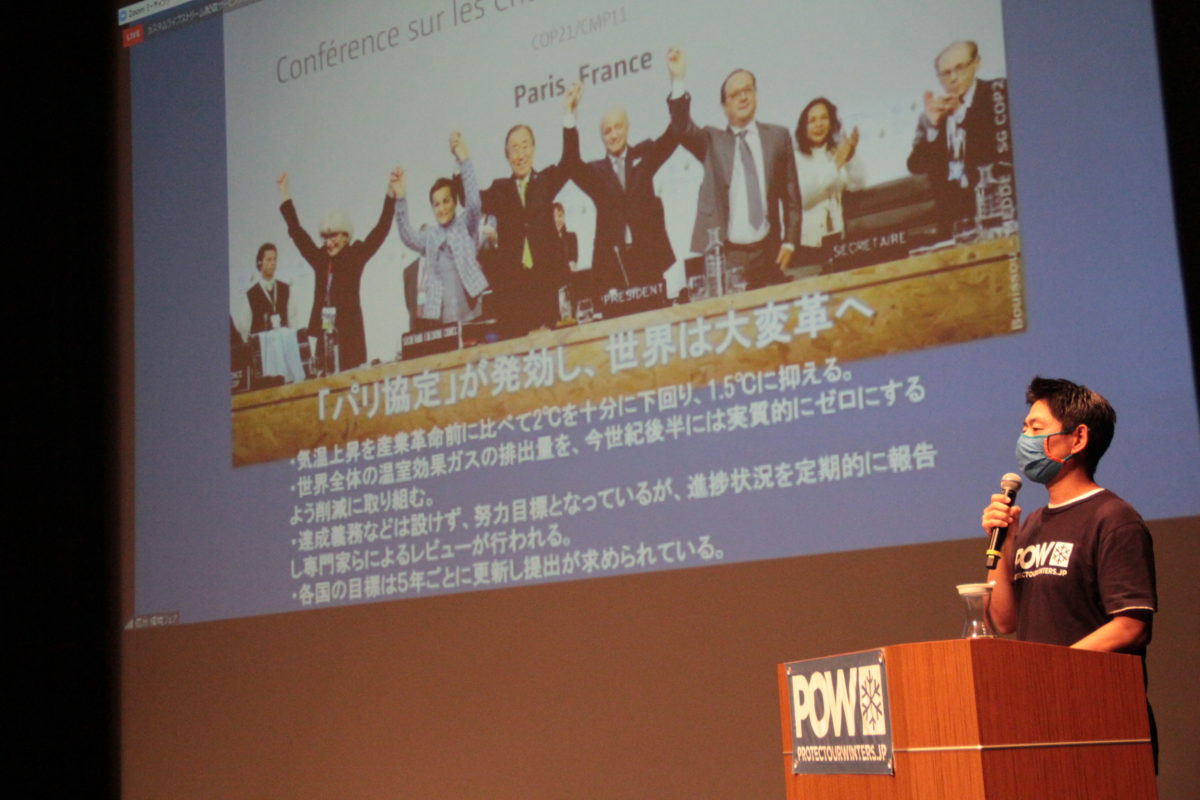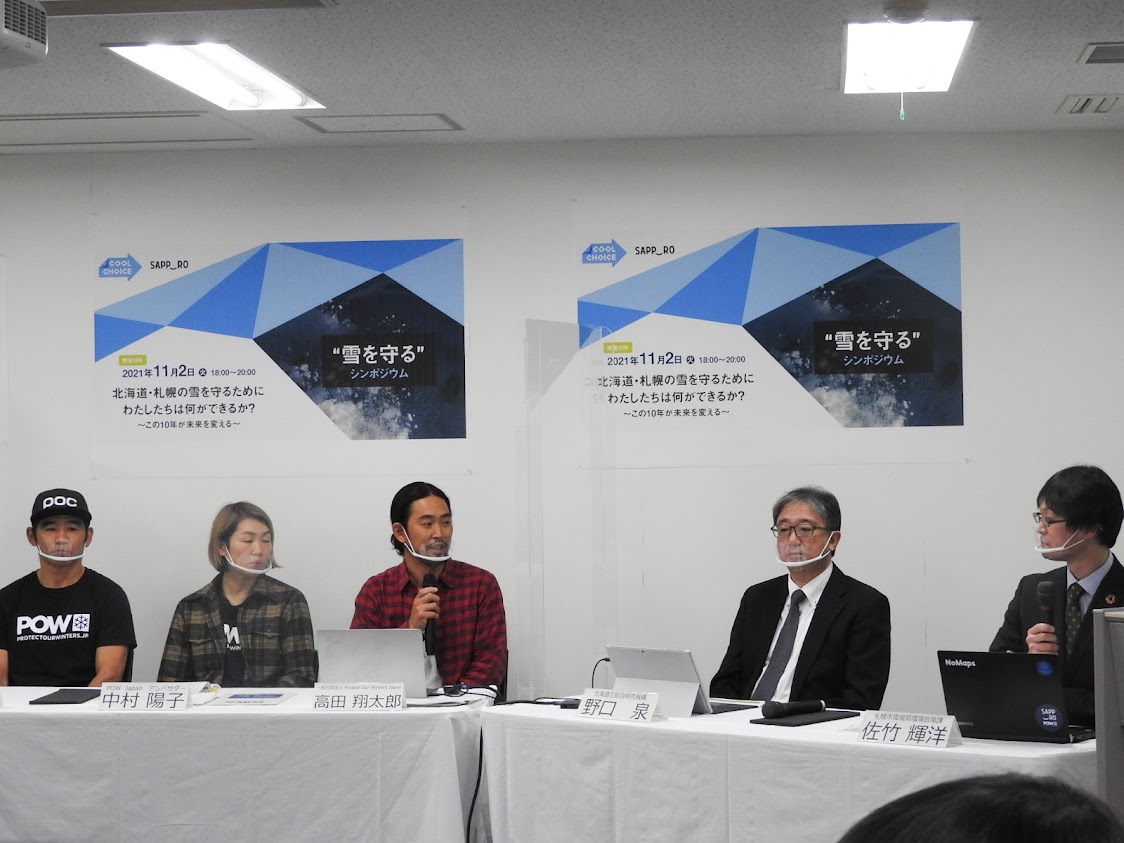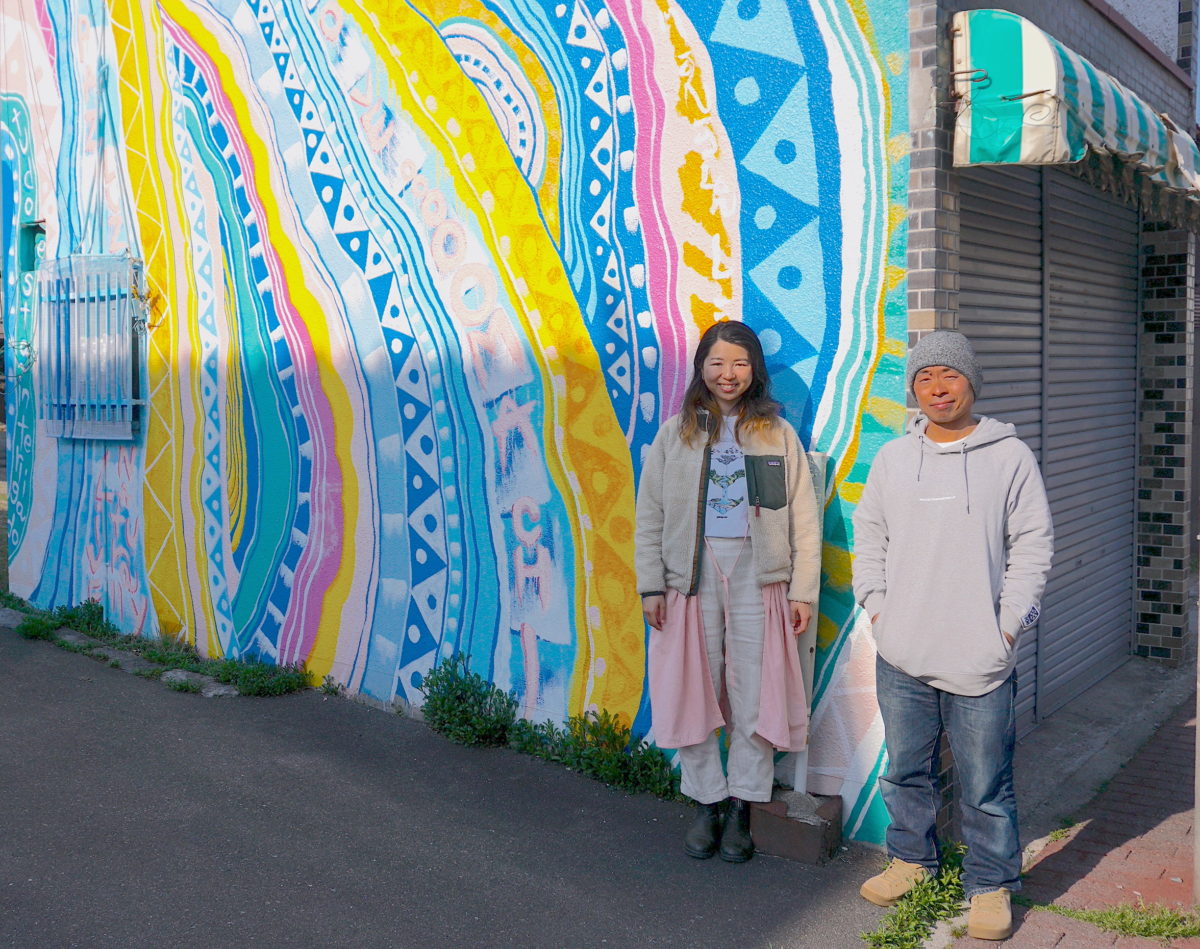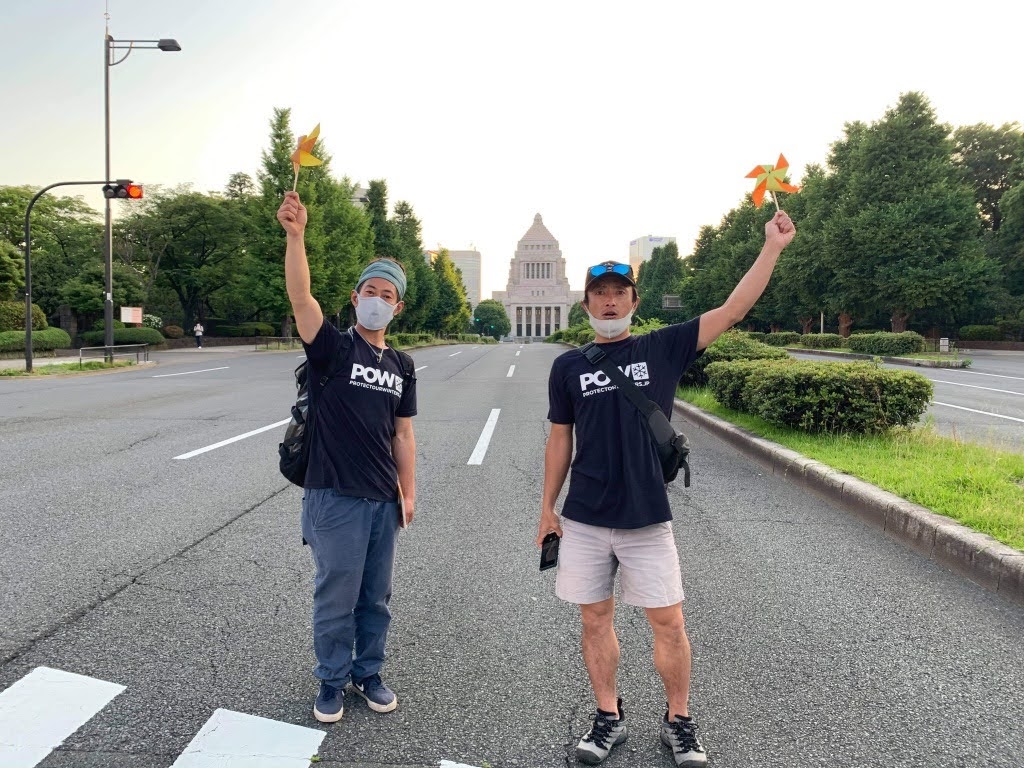*The photo above is in front of the National Diet Building where ambassadors Takuma Oike and Chikara Nakajima visited to submit their signatures saying, "Four more years, now is the time to protect the future."
POW (Protect Our Winters) is a global organization that raises its voice against climate change, which threatens the sustainability of the snowfields that are so important to skiers and snowboarders. STEEP editor-in-chief interviewed Mr. Goro Komatsu and Mr. Hitomi Suzuki, representatives of POW Japan, who are actively developing their activities in Japan, in the second part.
Click here part of the interview with POW JAPAN

https://protectourwinters.jp/
I have so many like-minded friends
――What is POW currently doing?
Komatsu: Changing countries is a big deal, isn't it? For example, I think there are various levels of places where voices can be heard, such as the level of municipalities, prefectures, and companies. It's not like I can't deliver my voice to the lawmakers.
Last year, I gave a lecture at the Shinshu Environmental Fair organized by Nagano Prefecture, and I had many opportunities to participate in government activities. In the prefecture, there is a movement to work on environmental initiatives in various sections, and I have been involved in various activities with people involved in tourism, cableways, ski resorts and snow towns, and I want to participate in such movements. So, I could see that it would lead to various changes.
As an example, we were able to connect with the cableway association in Nagano Prefecture, which gave us the opportunity to listen to the entire organization, and as a result, the entire prefecture cableway association became a supporter of POW.

――You can reach large organizations that you can't easily reach as an individual because you're an organization.
Suzuki: More recently, when the bill to revise the Energy Conservation Law for Buildings seemed to be on the verge of being postponed, POW asked for my opinion and I participated in the form of a signature.
Komatsu: That was amazing. It was almost decided that the bill would be sent off, but it has changed dramatically to the fact that it will now be submitted to the Diet in the end. The efforts and thoughts of many people came together to become one big power that moved the country. It was an experience of feeling it.
Suzuki: It was refreshing to hear that snowboarders' opinions were sought, and that POW's identity as an outdoor enthusiast was being conveyed to the government and politicians.
--That's great!
Suzuki: In January, I had the opportunity to speak with a person from the Sapporo City Sports Promotion Bureau. I couldn't raise my hand, so I asked for advice. I think it's becoming a good trend to have the opportunity to speak out so that the opinions of the skaters are reflected there.
--I see. We users can get a sense of committing to climate change and exercising together just by signing up or registering an email address and reading POW's mail magazine.
Komatsu & Suzuki: Yeah yeah!

―Sapporo is said to be on the lowest latitude as a place where the Winter Olympics can be held.
Komatsu: On the contrary, last year's report predicted that Sapporo would be the only place where the Winter Olympics would be held without any problems at the end of the century. It is quite shocking to think that among the snowy countries around the world that have hosted the Winter Olympics, such as Vancouver, Canada, only Sapporo can do it. How much will the earth warm up?
――As you saw in the video of Hakuba Valley's SDGs, it's not about worrying about climate change, it's about the dangerous timing if you don't take action right now, isn't it? Are you already in that state?
Komatsu: Many climate disasters are happening all over the world right now, and they are happening frequently in Japan as well. I don't think this has ever been the case before. When I went to Hokkaido in August last year, the temperature was over 36, 37 degrees every day. When I was in elementary school, I lived in Hokkaido, and I vividly remember saying, "It's hot!" when the temperature reached 25 degrees Celsius in the summer. Last year seemed special, but now I feel like everything has changed. After all, if you think calmly about it, I think everyone can feel that "we've already come this far". 20 years from now, 30 years from now, what will happen if we continue at the same pace...
Suzuki: Do you know that it is said that if we do not keep the temperature rise below 1.5 degrees since the industrial revolution began in the 1880s, we will be in big trouble? It is said that 1.5 degrees is already the limit line at which human life can be maintained in the midst of climate change, and it has already risen by 1.2 degrees. However, scientists announced just the other day that the 1.5 degree target that countries around the world are saying, "I will reduce my country's carbon emissions by this much," is no longer possible.
It is true that the situation is that serious, but it is said that there are options to control it if we take measures now.
So, after all, it is necessary to make changes in large units such as countries, and I think it is necessary to properly deliver our voices to that. *Let's know why the snow disappears and the cycle - "To protect the snow" from climate change
What each person can do
――At the same time as delivering your voice, what can you do as an individual as a skier or snowboarder?
Komatsu: You can do a lot by changing your awareness and actions. When something is burned, it produces carbon dioxide (CO2), so I think the closest thing to everyone is to avoid it as much as possible. For example, reduce the frequency of getting in the car, use trains and buses as much as possible, and be careful not to produce garbage as much as possible. Currently, most of Japan's electricity is generated by thermal power generation, which emits the most CO₂, so we must move in the direction of reducing it.
Individual households can easily choose to use renewable electricity. With so many power companies and plans out there, it's actually pretty easy to switch your home to renewable energy. Electricity bills have risen overall due to the effects of various social issues in recent years, but electricity derived from renewable energy is not much different from conventional electricity.
For example, in the case of our house, the electricity bill went up by 10 yen or 100 yen, but so far it's like that. But if changing that leads to a social movement to stop paying for thermal and nuclear power and increase the use of renewable energy, then I think that choice is a good one. It may be a form of investing a little in the environment, but it's very easy and has a big effect. I would like everyone to think about it.
――There are many things that each of us can do.
Suzuki: It is said that changing 3.5% of the population can bring about changes in society, and it has already been proven. Let's be that 3.5%.
Komatsu: Considering Japan's population of 120 million, it's about 4.2 million.
That's quite a number. But 3.5%, I think. I feel like there are about that many skiers and snowboarders. --4.2 million. I agree. That's pretty much it for now, isn't it? At its peak, it was said to have about 18 million people, but it is steadily declining, and now it seems that the total number of people is about 6 million (see Leisure White Paper).
Suzuki: If the number of skiers and snowboarders is 6 million, then there are more if you include the outdoor population. Something like 10 million people.
Komatsu: I can afford it (laughs), that might be good. "Become 3.5% Campaign"!! (smile). I think it will be a great power if you can spread the circle around you from the sliding hand.
Suzuki: Taking action may seem like a big deal, and you may have an image that your life will be more cramped than it is now, but on the contrary, it often makes you richer. I think. For example, it feels good to be clean without garbage, or it's fun to choose MY eco bag. The reality that awaits us in the future is quite serious, but it's hard to tell people around us that it doesn't look fun to take action, and it's hard to get them involved. I think it would be nice to have some leeway to do it for fun.
Komatsu: Doesn't this kind of activity feel somewhat core? Somehow, I tend to feel a little angry with society. But if your goal is to protect what you love and what's important to you in order to get better, then I think you should enjoy working on it. I want to enjoy the future as well.
Suzuki: You had a POW JAPAN ambassador session at Hakuba Norikura in February during the season. A high school student who participated was talking. “I had a lot of fun skating with the ambassadors. The skating was great, and I could feel their energy. I think." Ah, I thought that was important. Even if it is a steady process, if everyone does not give up on it, there is absolute meaning in sowing the seeds.
Komatsu: Professional athletes like us, the media, of course, but I think people in the position of local guides and school instructors have the potential to send strong life-changing messages. I think the time spent playing in the snow is a really precious time for many people, so it would be nice if I could send a good message.
I think everyone has an instinct that draws them to nature, so I think that by coming into contact with nature, you can feel the beauty of nature as well as its harshness. What I feel from things that aren't made by humans is still very big, and I feel like I'm being shaken by something, and it's a feeling that instinctively resonates with nature.
It's a city where it's pretty thin. I think there are many things that are efficient and convenient, but they are far from that, but there is an important and best part of life on this earth, and I think it's natural to be able to touch it. . The best way to get in touch with nature is to enjoy and play with nature.
Skiing, snowboarding, and other outdoor activities allow us to do that, so it would be great if more people could do it and experience it. I think it will also lead to I think it's a very natural flow to connect to POW from there. That's why I want to expand the experience of playing with snow and the creation of opportunities to get in touch with nature through snow.
As a professional snowboarder, I've always believed that my job is to tell as many people as possible that "Nature is the best! It's fun!" There is no sense of incongruity in telling them that you must protect the
I think there are quite a few people who think that they can't say anything without knowing a lot about things like climate change, decarbonization, the goal of zero CO2 emissions by 2030, and achieving carbon neutrality by 2050. Gone.
I think it's enough just to know that the snow is decreasing. I think that just saying, "The snow is decreasing. I want to do something about it" is enough motivation to take action.
――After listening to your story, the most important thing that skiers and snowboarders who support POW can do is to do something good for the environment, and then say, “Let’s skate together.” I thought it would be best to take as many people as possible to the snowy mountains and have them experience it.
Komatsu: That's true.
Suzuki: Yes!
――Goro-san and Hitomi-san, thank you very much! STEEP will also launch a new channel called " THINK SNOW " to send out various information on environmental issues. I would like to continue following the movements of POW.
the person who taught me

Hitomi
Suzuki
digital marketing
Born in Fujisawa City, Kanagawa Prefecture, and lives in Omachi City, Nagano Prefecture.
After working in customer service at Patagonia, he gained experience in digital marketing. He moved to Nagano prefecture after encountering POW JAPAN with the desire to "live in a place closer to nature."
Goro
Komatsu
Representative Director
Born in Niseko Town, Hokkaido.
Lives in Omachi City, Nagano Prefecture. He started skiing at the age of 4 and moved to BC Canada at the age of 12 to become a professional snowboarder. Even before the establishment of POW when he was living in Canada, he has continued to advocate reducing the burden on the natural environment. In 2018, he launched POW JAPAN as a representative director.
Narrator: Goro Komatsu, Hitomi Suzuki (POW JAPAN) Interviewer: Takeru Ogawa (STEEP Editor-in-Chief)
Interview recording: April 2022

